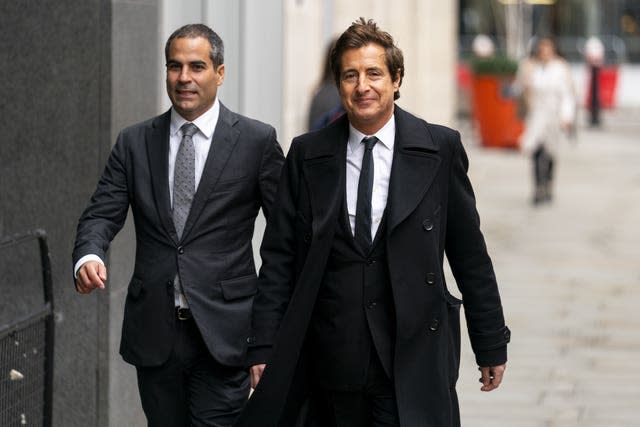Mirror phone hacking case ‘overwhelmingly successful’, court told
A phone hacking claim against the publisher of the Daily Mirror brought by figures including the Duke of Sussex was “overwhelmingly successful”, the High Court has heard in a bid for nearly £2 million in costs.
Last month, a judge ruled that phone hacking became “widespread and habitual” at the Mirror Group Newspapers (MGN) titles in the late 90s and was practised “even to some extent” during the Leveson Inquiry into press standards in 2011.
Mr Justice Fancourt also concluded that Harry’s phone was hacked “to a modest extent” by MGN, awarding him £140,600 in damages.
The duke, 39, said his partially successful case against MGN was “a great day for truth, as well as accountability” and called on the police to investigate the publisher of the Daily and Sunday Mirror and The People.
A follow-up hearing dealing with the consequences of the ruling began in London on Monday, where the High Court heard the group of people who sued the publisher are currently seeking payment of £1,976,660 from MGN towards the legal costs of bringing “generic” allegations to court.
David Sherborne, for the group, said: “We were the overall winners, clearly… we were overwhelmingly successful.”
In written submissions, the barrister said that “MGN’s dishonest and unreasonable defence” of the so-called generic case into unlawful information gathering at the publisher “resulted in a distinct and huge generic trial, which it resoundingly lost”.

Mr Sherborne added that decisions about the costs in Harry’s case against the publisher are reserved until the rest of his claim is determined.
Harry sued MGN for damages, claiming journalists at its publications were linked to methods including phone hacking, so-called “blagging” or gaining information by deception, and use of private investigators for unlawful activities.
On Monday, the High Court heard there are a further 115 articles in his claim after a sample of 33 were examined at the trial last year, which saw Harry enter the witness box, with 15 articles found to have been the product of unlawful information gathering.
Mr Sherborne said in written submissions: “Although the duke is certainly prepared to attempt to resolve the remainder of his claim through agreement, it is necessary to list the trial of the remainder of his claim as soon as is practicable.”
Roger Mallalieu KC, for MGN, told the court that the publisher made offers to settle with Harry but the terms of the offers were currently confidential.
The barrister said in written submissions that the group suing the publisher had only seen “partial success on the trial issues” and that those who lost their claims should pay their “respective share” of the so-called “generic” costs.
He said: “The starting point, and MGN submits the end point, is that unsuccessful claimants or claimants who have failed to beat MGN’s offers should in principle pay their share of MGN’s common costs.”
Harry’s case was heard alongside similar claims brought by actor Michael Turner, who is known professionally as Michael Le Vell and is most famous for playing Kevin Webster in Coronation Street, actress Nikki Sanderson and Fiona Wightman, the ex-wife of comedian Paul Whitehouse.
Claims brought by Sanderson and Wightman were dismissed by Mr Justice Fancourt because they were made too late, despite the judge finding that some of their complaints were proved.

Mr Sherborne is expected to ask for the green light from the judge to appeal against this decision.
Turner was awarded a total of £31,650 in damages after the judge ruled his phone hacking and unlawful information-gathering case was “proved only to a limited extent”.
In his written arguments, Mr Mallalieu said MGN would be seeking interim payments from Turner, Sanderson and Wightman of around £100,000 each.
“There are no good reasons why Ms Wightman, Ms Sanderson and Mr Turner should not make interim payments on account,” Mr Mallalieu said.
The four cases were considered as “representative” of the types of allegations facing MGN and Mr Justice Fancourt’s findings could affect the outcome of other pending claims, which include challenges brought by actor Ricky Tomlinson, the estate of the late singer George Michael and ex-footballer and television presenter Ian Wright.
On Monday, Mr Sherborne said there were 100 ‘live’ claims against the publisher, however, MGN’s lawyers told the court that around 75% of these could be found to have been brought too late.
An MGN spokesperson said: “We welcomed December’s judgment that gave the business the necessary clarity to move forward from events that took place many years ago.
“Where historical wrongdoing took place, we apologise unreservedly, have taken full responsibility and paid compensation.”
Mr Justice Fancourt will give judgment on a later date.


